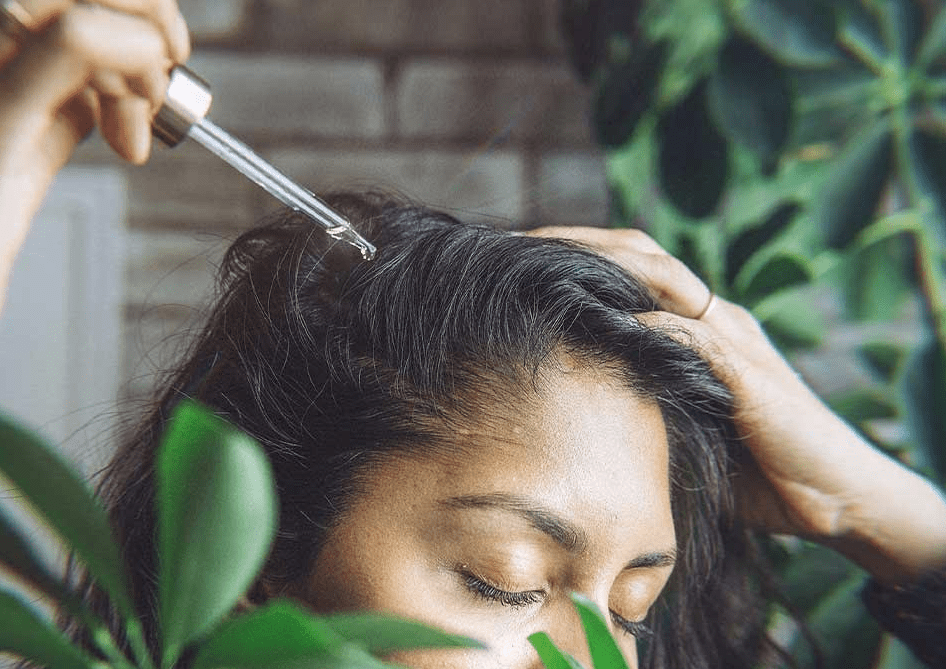
It’s certainly high times for the world of cannabis right now. As legalization continues across North America, it’s clear that the stigma around cannabis has been dramatically reduced with more people than ever buying and using cannabis products. CBD is a substance derived from the cannabis, or hemp, plant that has been proven to assist with an array of maladies; however, CBD is an all-natural gift that may also perform wonders for more than just your medicinal health. In this blog, we’ll explore CBD and its benefits for scalp health and hair growth.
Cannabis sativa L. is a hearty, nutrient-rich plant containing about a thousand and one molecules, including about 113 cannabinoid compounds. CBD, or cannabidiol, is one of those compounds. Cannabinoids occur naturally in the body and, as studied, CBD has been shown to provide relief for several ailments and illnesses including depression, anxiety, sleeplessness, and epilepsy. Additionally, CBD may provide significant benefits to the wellbeing of your skin and hair.
CBD should not be confused with THC, or tetrahydrocannabinol. THC is the principal psychoactive constituent of cannabis. The US government made a distinction to classify Cannabis sativa L. plants low in THC (less than 0.3% in dry weight) as hemp. The 2018 Farm Bill legalized the regulated production and commercialization of industrial hemp on a federal level; however, each state has the final say in whether or not cannabis-derived products are legal within their territories.
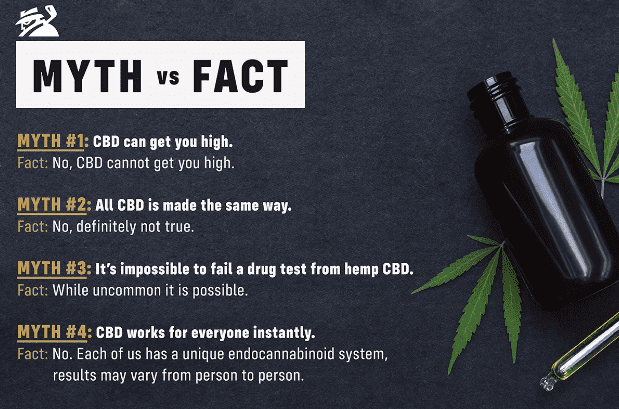 Source: My Golf Spy
Source: My Golf Spy
You can learn more about CBD here.
The growth and loss of hair may seem like a simple process, but the hair growth cycle is actually composed of three distinct phases. The three phases — anagen, catagen, and telogen — cover the growth and maturation of hair and the activity of the hair follicles that produce individual hairs.
Here’s a brief look into the stages of hair growth:
The stages of hair growth begin with the anagen phase. It’s the longest phase, lasting about three to five years for the hairs on your head, though for some people, a single hair could continue growing for seven or more years.
During the anagen phase, your hair follicles are pushing out hairs that will grow until they’re cut or they reach the end of their lifespan and fall out. At any time, about 90% of the hairs on your head are in the anagen phase.
The catagen phase starts when the anagen phase ends and tends to last about 10 days. During this phase, hair follicles shrink and hair growth slows. The hair also separates from the bottom of the hair follicle, yet remains in place during its final days of growing. About 5% of the hairs on your head are in the catagen phase at any given time.
Telogen is the resting phase and usually accounts for 6% to 8% of all hairs. It lasts for about 100 days for hairs on the scalp and longer for hairs on the eyebrow, eyelash, arm, and leg. During the telogen phase, new hairs start to form in follicles that have just released hairs during the catagen phase.
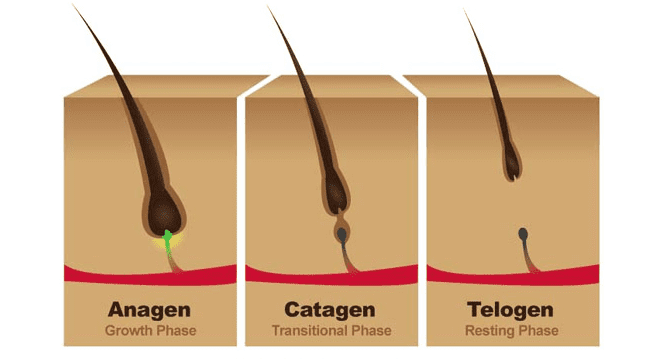
Pictured: Phases of hair growth Source: Advanced Hair Studio
Hormonal fluctuations and stress are some of the most common reasons for hair loss. The common hormone dihydrotestosterone (DHT) interferes with the hair’s growth cycle by shrinking and shortening the hair, thus making it easier for it to fall out and more difficult for it to grow back.
DHT is derived from testosterone, which is a hormone that’s present in both men and women. As you get older, testosterone and DHT have many benefits for your body, such as maintaining your overall muscle mass and promoting sexual health and fertility.
About 10% of testosterone in all adults is converted to DHT with the help of an enzyme called 5-alpha reductase (5-AR). Once DHT is freely flowing through your bloodstream, it can then link to receptors on hair follicles in your scalp, causing them to shrink and become less capable of supporting a healthy head of hair.
CBD interacts with several receptors; it works to achieve hormonal balance to aid in coping with hair fall and also stimulate hair growth.1 In addition, while testosterone comes from reproductive organs in response to the hormones LH and FSH from the hypothalamus, it’s been shown that CBD may affect LH and FSH levels, which can result in hormonal balance.2
Stress can also have an intense impact on your scalp health and overall nutrient availability for hair growth, which can influence hormone fluctuations that further the problem. CBD is known to possess anti-anxiety benefits that can aid in balancing stress levels in the body and in turn, keep hormones at the right levels to promote healthy hair.
One of the primary benefits of CBD for hair is that it contains a wide range of different amino acids, which are the building blocks of protein. As a result, CBD oil can potentially strengthen thinning hair and stimulate hair growth.
According to a study administered by Gregory L. Smith and John Satino, CBD oil may help with hair regrowth after hair loss. The study showed that people who topically applied CBD oil to their hair and scalp for six months saw successful regrowth.
In Smith and Santino’s study, the TRPV1 receptors, which are responsible for sending your hair into the catagen phase, were researched. CBD was found to communicate with the TRPV1 receptors by working to activate and soothe them excessively to the point that they become desensitized to other stimuli.
With the TRPV1 receptors being desensitized to outside factors, the study found that they are less likely to initiate the catagen phase of hair growth, thus prolonging the anagen phase and allowing hair to grow for a longer period of time.3

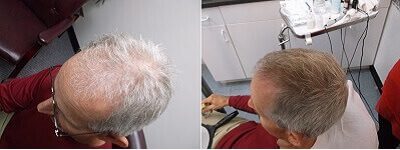
Pictured: Before and after photos of participants in Gregory L. Smith and John Satino’s study of CBD’s effects on hair growth Source: Hair Loss Cure
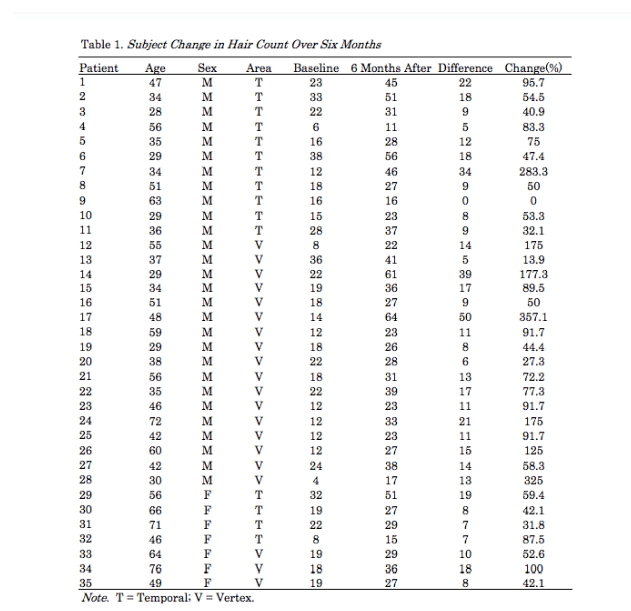
Pictured: Subject change in hair count over six months in Gregory L. Smith and John Satino’s study of CBD’s effects on hair Source: Research MJ
CBD also demonstrated promising results in a recent case study on 35 people at the Hair and Scalp Center in Clearwater, Florida. After six months, the hair in the temporal area increased by 74.1% in men and 55.2% in women. For the vertex, the findings showed an increase in hair growth of 120.1% for men and 64.9% for women.4
Additionally, after extensively studying hair follicles from patients with alopecia, a 2021 study found that CBD might also have a modulating effect caused by hormones or an excess of the signaling pathways. The study concluded that CBD may be a promising application for alopecia treatment.5
There are an array of compelling studies that suggest CBD is good for the scalp by reducing inflammation, therefore supporting hair growth. With that being said, CBD could be a game-changer when it comes to hair rejuvenation.
CBD works by interacting with the body’s endocannabinoid system (ECS), which is composed of a network of endogenous and exogenous cannabinoids and their receptors. The ECS plays a crucial role in maintaining a state of balance throughout the body and mind.
In addition to interacting with endogenous ECS receptors, CBD can also influence cell receptors outside of the ECS. This includes binding to TRPV1 receptors, which are receptors that play a role in the perception of heat and pain.
All of these different receptor types exist on the scalp. Endocannabinoids have even been found in certain cell populations of hair follicles; therefore, it stands to reason that CBD could hold the potential to influence scalp health.
Many different issues can affect the scalp, and some are extremely common. Here are just a few of the most widespread scalp conditions, and how CBD might be able to help:
As many as 25% of adults may suffer from an itchy scalp, which can be associated with other ailments or nerve damage. However, in some cases, there is no apparent physical cause.
The scalp produces large amounts of an oil called sebum, which helps protect the skin and hair. It also controls the microbiota of the scalp, which is the population of microorganisms, including bacteria and yeast that naturally live on the skin.
One particular genus of yeast, known as Malassezia, has an intimate relationship with sebum; it converts the sebum into free fatty acids that leave a residue on the scalp. If this residue becomes excessive, it can cause scalp itching, irritation, and dandruff.
It’s possible that, by interacting with endocannabinoids, CBD could help to relieve an itchy scalp. In fact, a 2006 study for the journal Der Hautarzt found that 14 out of 22 patients who applied a cannabinoid cream topically experienced a reduction in itchy skin. 6
CBD is known to reduce sebum production; therefore, it could potentially relieve scalp itching that stems from overly productive sebaceous glands.7 However, more research is necessary to confirm how effective it is.
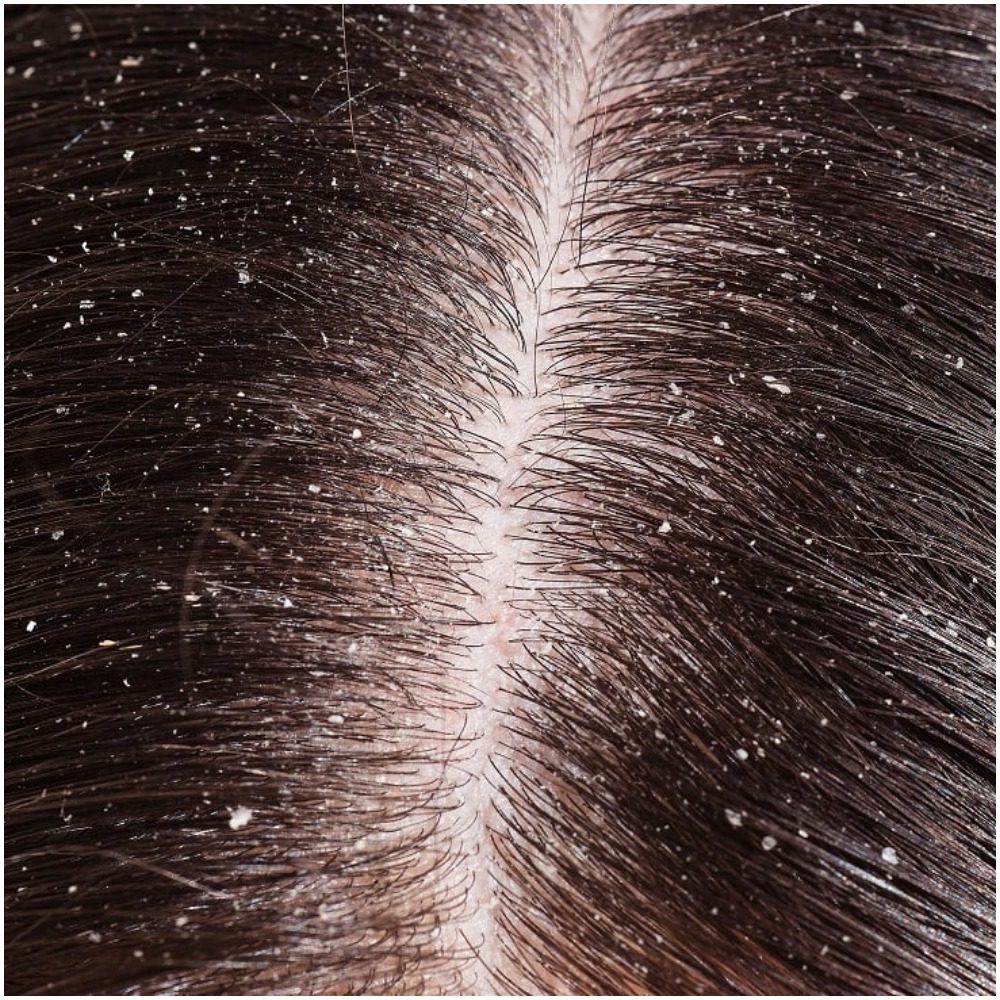
Pictured: Dandruff Source: First Derm
Dandruff is another common scalp problem that affects up to 50% of adults. As well as causing itching and irritation, dandruff can be a cosmetic concern due to the flakes that it produces. Like an itchy scalp, dandruff is often related to sebum production and yeast overgrowth.
CBD may help reduce the effects of dandruff in many of the same ways it could relieve itching. In fact, reducing itching could also limit scratching, which often leads to a flaky scalp.
There is currently no research specifically on CBD oil for dandruff; however, there is some evidence that it helps with the maintenance of healthy skin, so anyone – with a doctors approval – could give CBD-infused products a try.8
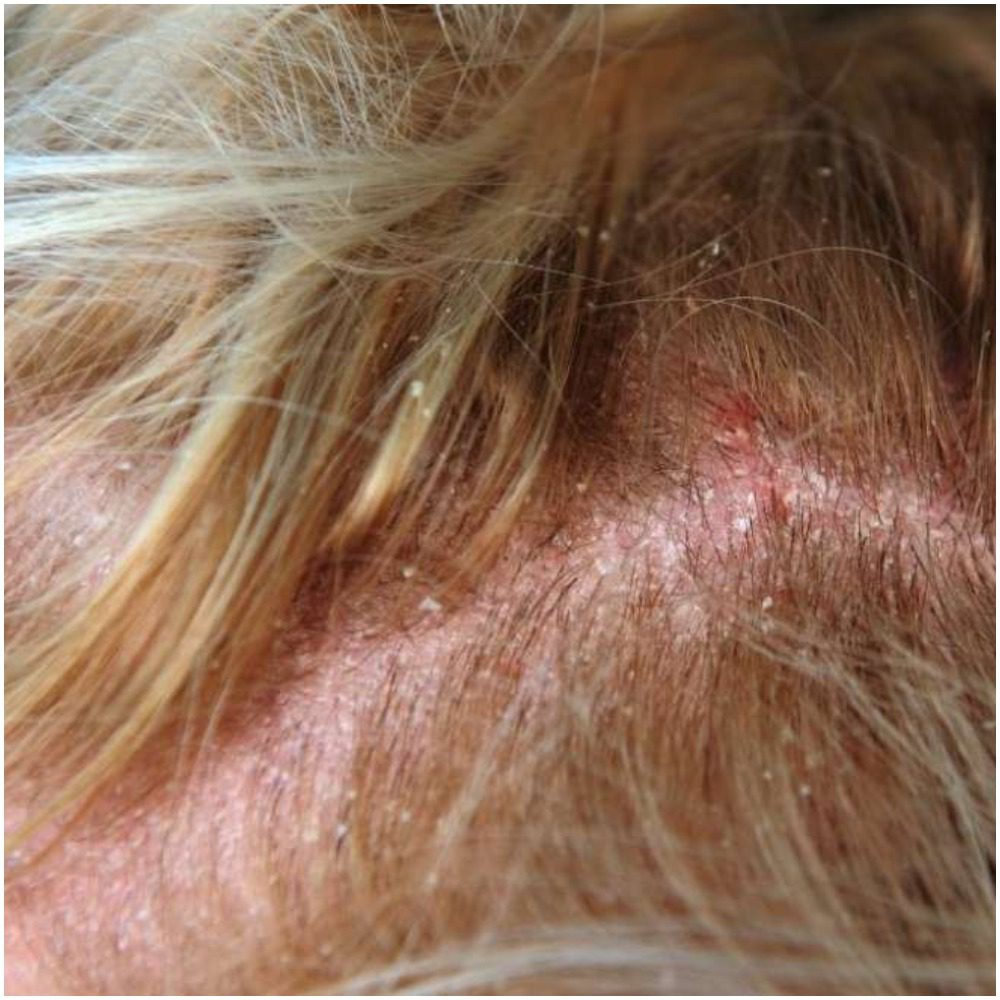
Pictured: Seborrheic Dermatitis Source: Midlands Dermatology
Yet another condition associated with sebum, yeast, itching, and dandruff is seborrheic dermatitis. In addition to the above symptoms, this skin condition can also cause redness and lesions on the scalp. It’s a common problem in babies and is known as “cradle cap.” Seborrheic dermatitis can also affect the face and chest.
The primary cause of seborrheic dermatitis is the overproduction of sebum. A 2014 study for The Journal of Clinical Investigations found that CBD has sebostatic effects, meaning it inhibits the release of sebum.9
Most of the research to date has focused on how CBD could help acne.10 However, in combination with its anti-inflammatory effects, CBD could potentially provide an effective treatment for seborrheic dermatitis as well.
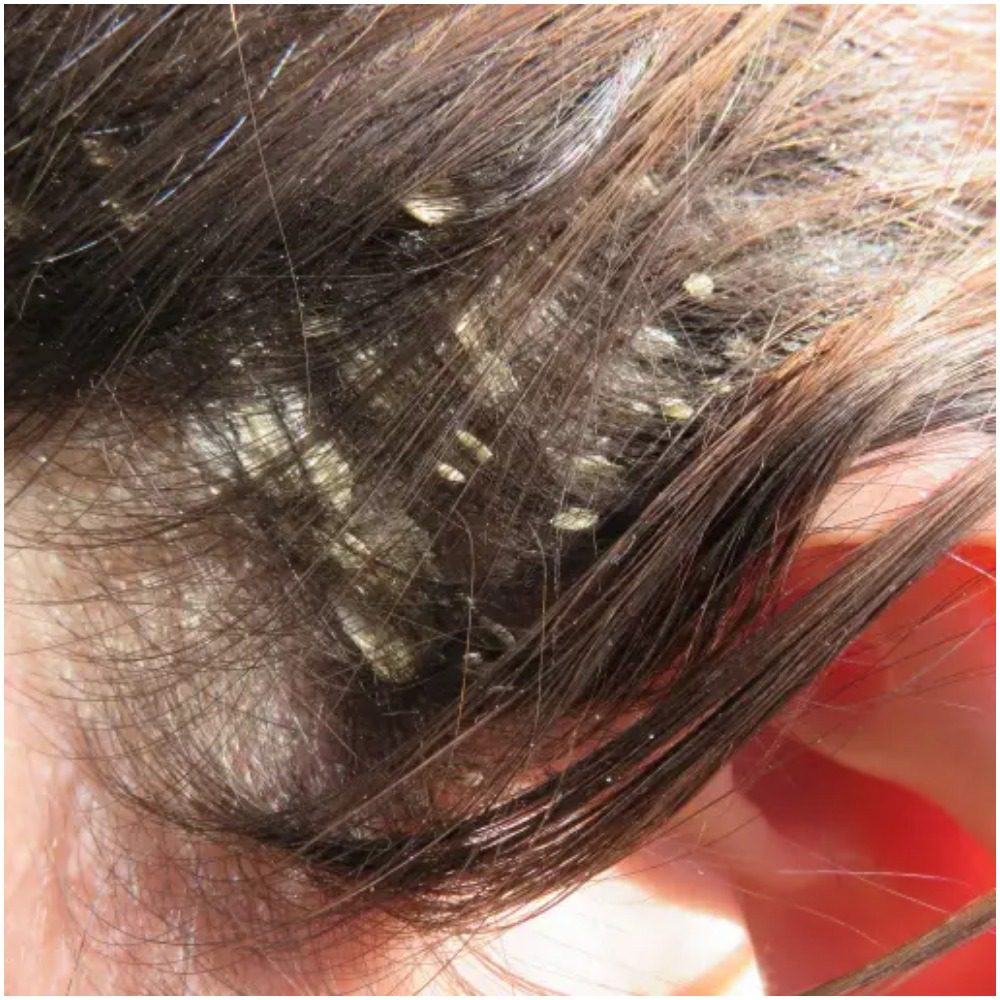
Pictured: Scalp Psoriasis Source: Health Central
Psoriasis is an autoimmune skin condition in which skin cells grow too rapidly, forming thick patches known as plaques. Plaques are often itchy, red, and covered in scales. One of the most common areas affected by psoriasis is the scalp. In fact, as many as 80% of patients with psoriasis have it on their head.11
One primary concern associated with scalp psoriasis is that it can also lead to hair loss. Therefore, in addition to suffering the various discomforts of the disease itself, people with psoriasis often feel self-conscious about their appearance.
A 2007 study published in The Journal of Dermatological Science found that cannabinoids could have beneficial effects on psoriasis. The researchers tested CBD, THC, CBG, and CBN on human keratinocytes (skin cells) and the results showed that all of the compounds inhibited cell proliferation in a “concentration-dependent” manner.12
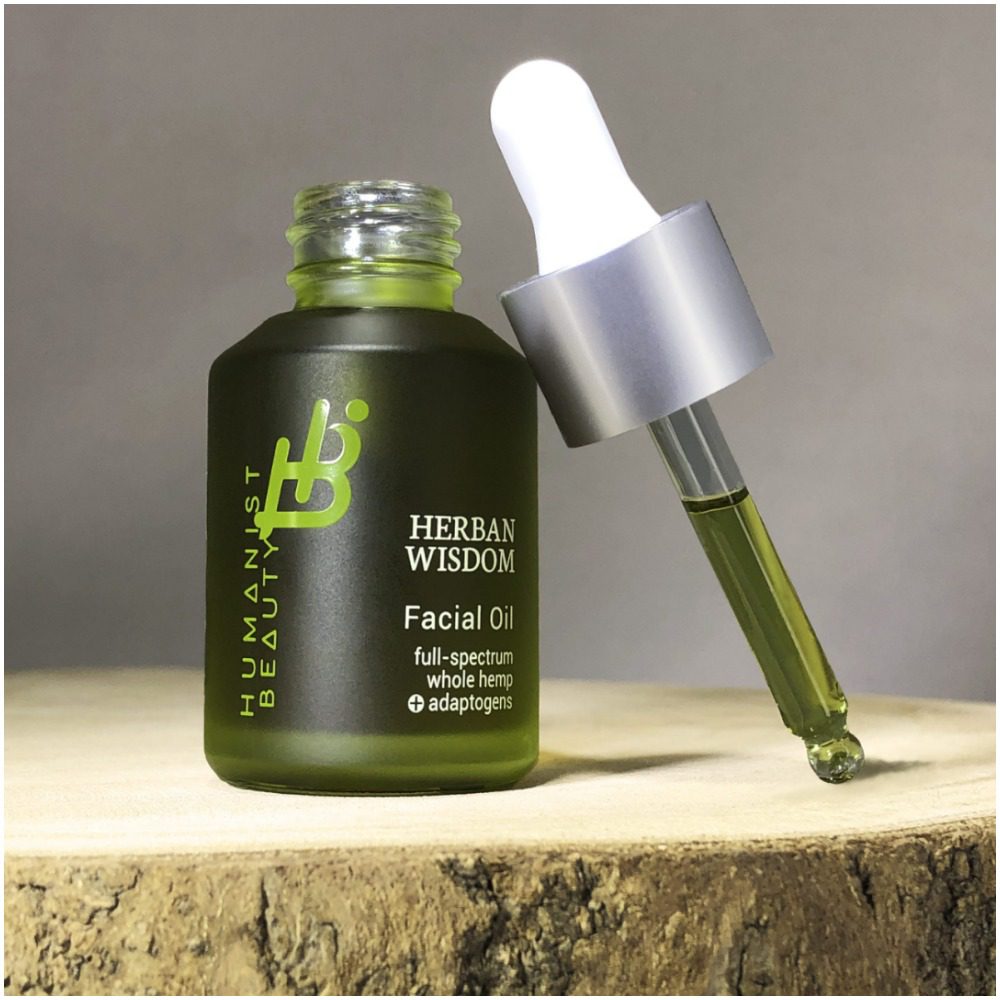 There are simple ways of utilizing the power of CBD to promote healthy and beautiful hair. For example, you can explore CBD infused hair care on the market or use other high-quality CBD oil-based products, such as the Humanist Beauty Herban Wisdom® Facial Oil.
There are simple ways of utilizing the power of CBD to promote healthy and beautiful hair. For example, you can explore CBD infused hair care on the market or use other high-quality CBD oil-based products, such as the Humanist Beauty Herban Wisdom® Facial Oil.
Not only can the Humanist Beauty Herban Wisdom® Facial Oil be used on your skin, but it can also be applied to your scalp and hair to provide deep moisture and reduce redness and irritation.
We are meticulous about the quality and purity of the cannabinoids contained in our products as well as the accuracy of our claims. That’s why we triple-test every batch as follows to ensure you receive products with cannabinoid quality, potency, purity, accuracy, and consistency
It’s important to know that Humanist Beauty products are not intended to diagnose, treat, cure, or prevent any diseases or medical conditions, so if you’re suffering from hair loss or a scalp condition, visit your practitioner to see if CBD infused products are right for you.
You can shop the Humanist Beauty Herban Wisdom® Facial Oil here.
—
Resources:
https://cfah.org/cbd-oil-and-testosterone/ [1]
https://juna-world.com/blogs/news/cbd-hormones [2]
https://pubmed.ncbi.nlm.nih.gov/17157480/ [3]
https://ilesol.com/3-4-mg-of-cbd-once-a-day-leads-to-93-5-increase-in-hair-growth/ [4]
https://www.ncbi.nlm.nih.gov/pmc/articles/PMC8220510/ [5]
https://pubmed.ncbi.nlm.nih.gov/16874533/ [6]
https://www.ncbi.nlm.nih.gov/pmc/articles/PMC4151231/ [7]
https://www.ncbi.nlm.nih.gov/pmc/articles/PMC7736837/ [8]
https://pubmed.ncbi.nlm.nih.gov/25061872/ [9]
https://wayofleaf.com/cbd/ailments/cbd-for-acne [10]

Disclaimer: Statements on this website have not been evaluated by the FDA. These products are not intended to diagnose, mitigate, treat, cure, or prevent any disease, nor are the products intended to affect the structure or any function of the body of man/woman or other animals. CANNABIDIOL USE WHILE PREGNANT OR BREASTFEEDING MAY BE HARMFUL. KEEP OUT OF REACH OF CHILDREN. Humanist Beauty Herban Wisdom products include hemp extract that contain less than 0.3% THC. Products containing CBD or THC are not to be used by or sold to persons under the age of 21.
We don’t retouch the skin of the model humans shown on this website. Keepin’ it real.